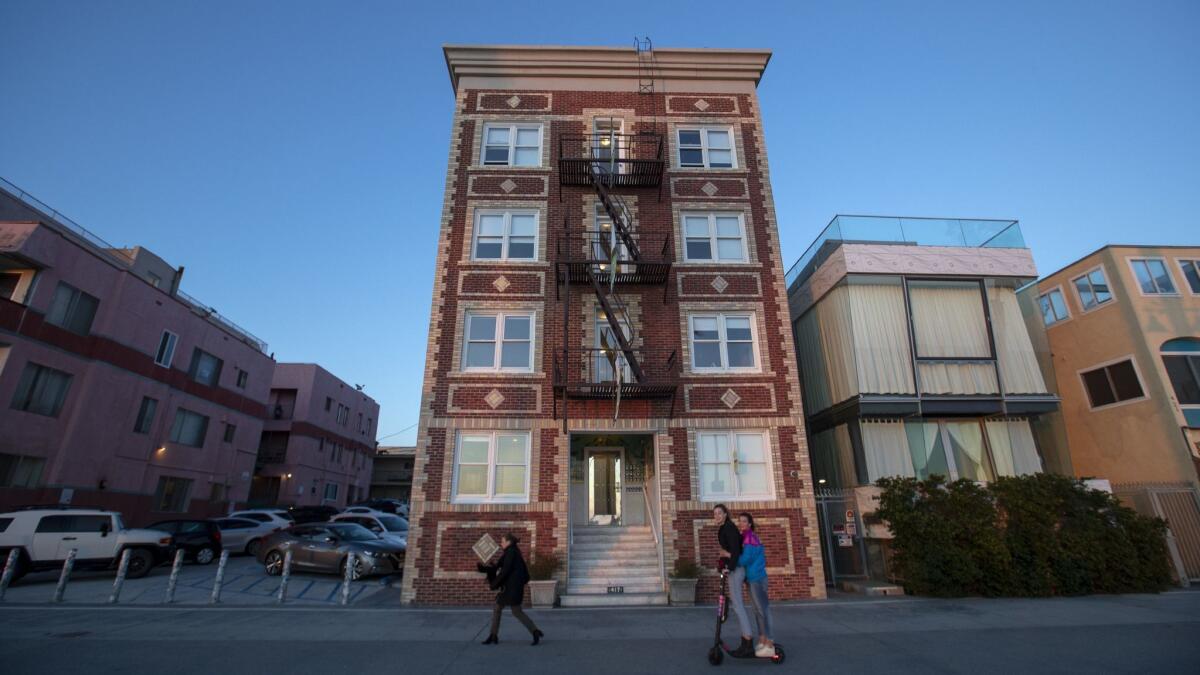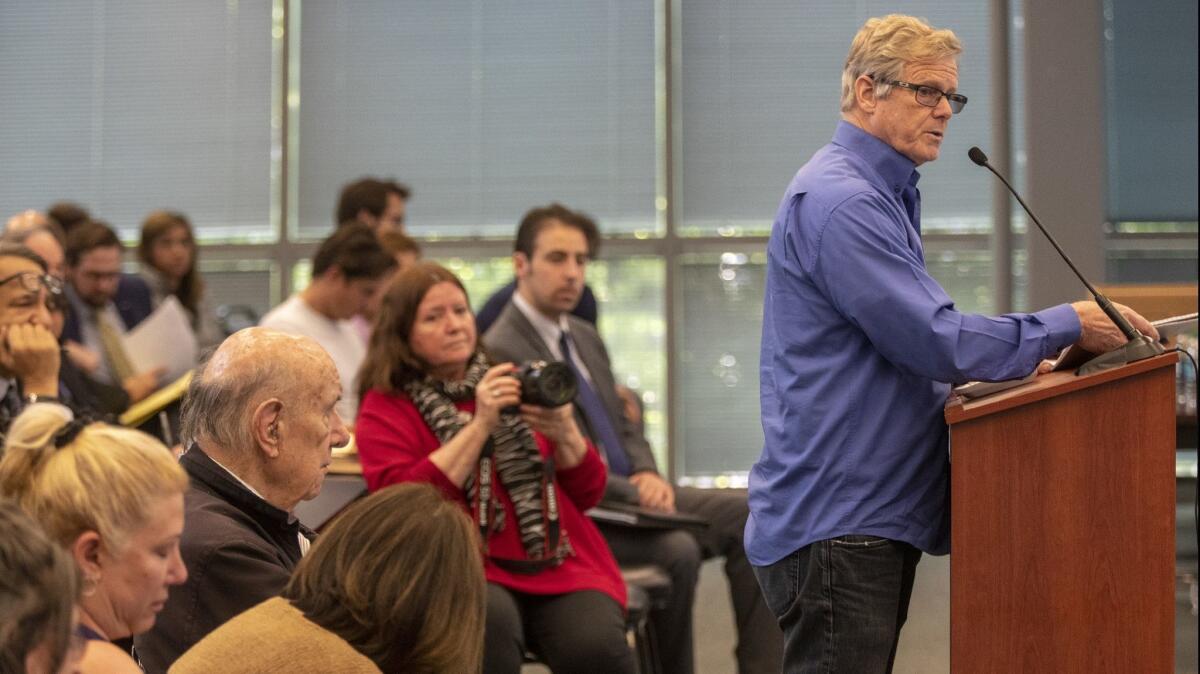Column: Killing off rent-stabilized apartments to make way for tourist hotels? The struggle for the soul of Venice Beach rages on

On Monday morning, I walked from my house near the Venice Pier north along Ocean Front Walk. I wanted to check on something I heard last week at a West Los Angeles Area Planning Commission meeting that made me question my sense of reality.
At the meeting, I heard folks who own stores along Ocean Front Walk tell planners that the Venice boardwalk is a commercial space, hardly residential at all, and that Venice has a severe hotel shortage.
Therefore, argued the entrepreneurs, a landlord who converted a 32-unit rent-stabilized apartment building to a hotel without proper permits and in apparent violation of zoning laws should be allowed to keep operating his business.
Despite the city’s insane housing shortage, they said, he should not be forced to restore the rent-stabilized units. Nobody lives on the boardwalk, see. It’s tourist central.
“I’ve lived on the boardwalk for 50 years,” said Jordan Monkarsh, owner of Jody Maroni’s sausage stand, a Venice boardwalk fixture. “To say that my area is residential is silly.”
Which is how I found myself standing in front of Monkarsh’s famous sausage shack on Monday, trying to validate my own belief that the boardwalk is every bit as much a residential neighborhood as a commercial one.
Sure enough, Jody Maroni’s is dwarfed by the five-story apartment building next door.
I guess it is possible to be so distracted by the T-shirt shops, restaurants and sidewalk vendors that you can miss the fact that the boardwalk is full of residences, too. True, the homes are not your typical suburban affair. They befit the urban beach environment; there are new multimillion-dollar houses jammed up against funky apartment buildings and run-down shacks.
Much of the recent debate over the future of Venice Beach has focused on the incursion of tech companies such as Snapchat and Google, which have displaced many small businesses and turned once-thriving blocks into locked-up, blank storefronts.
But the housing market is really at the heart of the enduring struggle for the soul of Venice Beach. Will it be able to remain one of the only demographically mixed beach enclaves in the state, or become a more colorful version of Santa Monica’s hyperconsumerist Third Street Promenade, with a few strategically placed sidewalk performers, graffiti walls and skateboard pits to remind us of what Venice used to be?
::

Carl Lambert was pleasant but not super chatty when I called him Monday. “Anything I say can and will be used against me,” he said.
Lambert is the landlord at the center of last week’s planning meeting. In 2005, he bought an apartment building at 417 Ocean Front Walk and converted 30 of 32 units into hotel rooms. According to the hotel’s website, rooms at the Venice Suites go for $255 to $329 a night in the summer high season and well under $200 a night in winter. That’s a lot more revenue than he’d get from the rent-subsidized tenants who used to live there.
In 2015, he was cited by the city — at the urging of local housing activists — for operating a hotel without the proper occupancy permit.
Then, two years ago, it became unavoidably clear that the short-term rental craze was taking thousands of rental units off the market in Venice Beach, exacerbating an already severe housing crisis. City Atty. Mike Feuer sued a few landlords, including Lambert, claiming he was not just illegally operating a hotel in a residential zone, but falsely advertising it as such and engaging in unfair competition. (Later, the City Council adopted regulations covering short-term rentals, but don’t hold your breath that they will ever be enforced.)
Though Lambert won a preliminary technical victory in court last year, the suit has not been fully resolved and a trial is scheduled for the end of May.
“I’m a preservationist of buildings,” Lambert said. “Everybody was happy with the properties I saved until the Airbnb phenomenon. Now, I’m the scapegoat.”
Indeed, he is often vilified by housing advocates and neighborhood preservation folks. Lambert has been accused by housing activists of converting five rent-stabilized apartment buildings in Venice to hotels, thus removing more than 125 units from the market.
(He told me that two of the buildings had always been operated as hotels, but declined to discuss the others.)
A recent critical story in the community paper, the Free Venice Beachhead, bore the headline “The Carl Lambert Problem.”
::
Last week at the planning commission meeting, Venice resident David Ewing called Lambert a “one-man housing crisis.”
On the phone, Lambert was silent for an uncomfortably long moment when I asked him to respond.
“Every Venetian has their own idea of what Venice has been and should be,” he finally said. “But Venice is about change.”
He’s right, of course. There’s no holding back the tide of money that has swamped Venice.
But is accommodating tourists an important value?
Lambert saw an opportunity to make money and made his move, hoping to persuade city officials after the fact that what he did is in the best interest of the community, and those beautiful old buildings.
I’m not among those who think that Venice, which is only three square miles, needs more hotels. We need more housing.
In October, a city zoning administrator ruled that the Venice Suites building is zoned for medium-density residential use only, and does not qualify for rezoning. Lambert appealed that decision last week. His supporters attested to Lambert’s generosity and good citizenship. But Lambert’s personality and civic engagement were not at issue.
Three planning commissioners unanimously upheld the denial of his zoning change application. Before casting her vote against Lambert, panel Chairwoman Lisa Waltz Morocco wryly nailed the problem:
“I think the appellant has already granted himself a variance,” she said.
Unfortunately, that does seem to be the way things work in Venice.
Twitter: @AbcarianLAT
More to Read
Inside the business of entertainment
The Wide Shot brings you news, analysis and insights on everything from streaming wars to production — and what it all means for the future.
You may occasionally receive promotional content from the Los Angeles Times.








